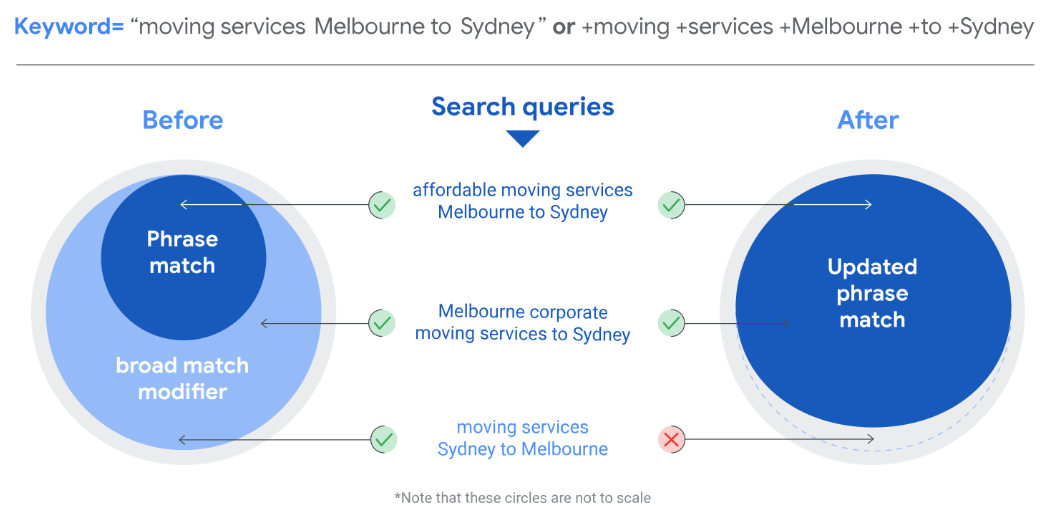So, what's changed?
The fast-moving Google train has tweaked keyword match types again, with broad match modified keywords (BMM) being phased out from late Feb to July. Never fear if this is news to you; all your BMM keywords will automatically transition to phrase match as the changes roll out… but phrase match type has undergone some renovations, too.
Let’s take a look at what those changes are and what they mean for advertisers.
The new phrase match
Out of the traditional match types (broad, phrase and exact), phrase has been the least used in our accounts here at indago. This is because broad match modified all but covered what phrase match could do whilst ensuring the account wasn’t subject to the flood of queries broad match type shows up against. With BMM phased out, phrase match has been handed some of its duties. It will continue to include same-meaning close variants, as per changes rolled out in 2019, but phrase match will now also consider word order (when it's relevant to meaning).
Here’s Google’s example: the phrase match keyword “moving services Sydney to Melbourne” will continue to cover searches like ‘affordable moving services Sydney to Melbourne’. It will also cover searches traditionally only matched under broad match modifiers, such as ‘Sydney corporate moving services to Melbourne’. Phrase match won’t show ads for searches where the wording is reversed (for example, people looking to move from ‘Melbourne to Sydney’).

BMM will be missed, but considering the direction Google Ads is going in, this change isn’t too much of a surprise especially if we look at how Google has slowly introduced close variant matching and expanded its role across the current match types.
Combine this with the increasing use of audiences across search campaigns and the increasing effectiveness of automated bid strategies (over manual CPC bidding), and the traditional keyword bidding model is becoming more and more obsolete.
It’s likely that Google’s decision ultimately came down to sunsetting either broad match modified or phrase and, considering phrase is the OG, Google stuck with it.
What are the pros?
Google tends to take the stance that simplifying keywords makes reaching customers easier and to some true extent. For small businesses with limited resources, for example, these simplifications make it easier to run paid search in-house.
Account structures will become more concise, easier to understand and more straightforward to manage, which, in turn, will help Google bidding algorithms as each keyword collects more data than before.
And now, the cons
Removing BMM will result in advertisers having even less control over edge-case scenarios where close variant matching has issues.
Phrase keywords will likely experience an increase in traffic volume. As this change is starting to roll out (from Feb until July 21), it’s critical to keep a close eye Search Query Reports to lessen the impact of irrelevant searches.
The new broad match
Google is, in essence, trying to convince paid search marketers that it’s safe and useful to serve ads for broad match keywords. We’ve rarely considered using broad match; instead, we've used BMM for keyword mining. Now, if we want to explore more about our customers’ search behaviour, expand our reach and find more converting keywords that we haven’t thought of, we can try broad match as it has also undergone an upgrade.
Google says, “Broad match now looks at additional signals in your account to deliver more relevant searches. When paired with Smart Bidding (automated bid strategies that use machine learning to optimise conversions), these broad-match signals – which include landing pages, keywords in your ad group, and more – can help you unlock new opportunities for your business”.
Levelling the playing field
With close variant matching, finding the opportunities you’ve missed, remember it is also finding the opportunities your competitors have overlooked. There will no doubt be a levelling in search term bidding as competitors discover effective variants without having to mine for them actively, and bidding wars ensue. Where once you could discover a popular term that had gone undiscovered, close variant matching has narrowed this gap.
To stand on a playing field that’s levelling out, it’ll become more important than ever to put time, effort and testing behind your ad creative and to provide prospective customers with an outstanding landing page experience if you want your paid media spend to yield above average results.
Negative keywords
Although phrase match will continue to keep intent in mind when it comes to your search traffic, it will be important to continue to use negative keywords to exclude matches you don’t want. Phrase-match keywords are going to open up to more traffic than they had before, so evaluating keywords and adding negatives should be a frequent task within an account. Note: phrase match negative keywords have not changed.
What it means for advertisers
Advertisers using phrase match keywords are forced to improve their performance by using machine learning and automated bid strategies, which, we have found, work better than manual CPCs. There might be some cases where advertisers will have to work with extra keyword exclusions. Still, this change brings more benefits than leaving as it was, especially for small advertisers with limited budgets.
So, while some adjustments will be required, removing broad match modified keywords and changes to phrase match keywords will cause minimal impact. For advertisers who are willing to put time into optimising their paid media spend with great ad creative, automated bid strategies, sticky landing pages, and carefully considered keyword exclusions, Google’s updated phrase and broad match types provide opportunities to appear in more terms and spread budgets further while saving time on managing keywords… but those benefits can only be reaped once you’ve spent the time required to recalibrate your campaigns effectively.
Written by
Gary Nissim





